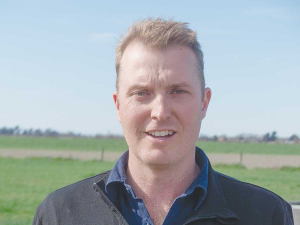'Foodie February' spotlights New Zealand potatoes
This year, 'Foodie February' sees potatoes take the spotlight as one of New Zealand's most powerful and versatile food heroes.
 Third-generation grower Daniel Lovett, of Lovett Family Farms, near Ashburton. The Lovett farm alone produces more than 10% of the 550 million potatoes processed at McCain’s Timaru plant each year.
Third-generation grower Daniel Lovett, of Lovett Family Farms, near Ashburton. The Lovett farm alone produces more than 10% of the 550 million potatoes processed at McCain’s Timaru plant each year.
The inability to bring in experienced overseas workers is one of the big difficulties for the potato industry as it heads into the next growing season amid COVID-19.
Third-generation grower Daniel Lovett, of Lovett Family Farms, near Ashburton, supplies potatoes for the McCain’s processing factory at Timaru. He also produces onions, carrots and other vegetables for other processors.
With more than 1000 ha, the farm employs 14 fulltime staff. At this time of year, the ground is being prepared for the new season and Lovett would normally also have four or five experienced overseas staff helping out.
He has employed three locals but says it is not the same as someone with experience of the modern million-dollar machines in use.
“It was great having overseas boys because they grew up with vegetables their whole life and they could jump on that machine and they knew how to operate and make it work, but that can’t happen this year,” he told Hort News.
“Harvest will be the tighter period; we’ll need more people then and so will every other farmer in Canterbury really.”
Meanwhile, Lovett says the industry is facing competition from cheap imports, particularly from Europe, where because of Covid-19, subsidised growers have lost their usual market – chips for restaurants and soccer crowds.
“I was talking to a guy in Holland last night and he said that there’s new potatoes being harvested in Europe at the moment, which are going straight to the cows.”
Some are also finding their way to New Zealand, despite calls from Potatoes New Zealand for a ban on cheap imports.
Lovett says supermarket shoppers should look at the labels on house-brand frozen chips before they buy.
“Hopefully, the general public will just keep asking where the fries are coming from.”
The potato processor McCain Foods describes Lovett as one of the many Canterbury growers it is proud to work with.
The Lovett farm alone produces more than 10% of the 550 million potatoes processed at McCain’s Timaru plant each year. Lovetts have supplied McCain since 2000.
McCain says that when it opened the plant in 1994, it was focused on forging strong relationships with New Zealand growers and has always underpinned its operations by growing “green and local.”
“McCain Foods’ success is grounded in the people we work with – and the reliability and dedication of our local growers like the Lovett family is a key part in that success,” says John Jackson, McCain Foods ANZ Agricultural Director.
“We’re proud to be bringing premium produce from our trusted New Zealand growers to supermarket freezer aisles. And we will continue to strengthen our bonds to our local communities to provide better outcomes for our customers and our growers.”
A subsidiary of a Canadian parent company, McCain Foods operates from sites in Victoria, New South Wales and Tasmania, as well as Hawkes Bay and Timaru.
“We’ve encountered a vast amount of issues, from weather extremes, seedline issues, fertiliser trials, soil borne diseases, over/under production and the potato psyllid,” Lovett told Hort News. “But we have always been able to work through those problems with McCain’s team.”
The Meat Industry Association of New Zealand (MIA) today announced that Chief Executive Officer Sirma Karapeeva has resigned from the role.
The winners of the 2026 Hawke’s Bay/Wairarapa Dairy Industry Awards were announced at the annual awards dinner held at Copthorne Solway Park in Masterton on Thursday evening.
Environment Southland is welcoming this week’s decision by the Environmental Protection Authority (EPA) to approve the release of Blaptea elguetai, a leaf‑feeding beetle that will help control the highly invasive Chilean flame creeper.
This March, the potato industry is proudly celebrating International Women’s Day on 8 March alongside the International Year of the Woman Farmer, recognising the vital role women play across every part of the sector — from paddocks and packhouses to research, leadership, and innovation.
Fruit trader Seeka posted a record profit and returns to shareholders in 2025.
Recent weather events in the Bay of Plenty, Gisborne/Tairawhiti, and Canterbury have been declared a medium-scale adverse event.

OPINION: A mate of yours truly reckons rural Manawatu families are the latest to suffer under what he calls the…
OPINION: If old Winston Peters thinks building trade relations with new nations, such as India, isn't a necessary investment in…